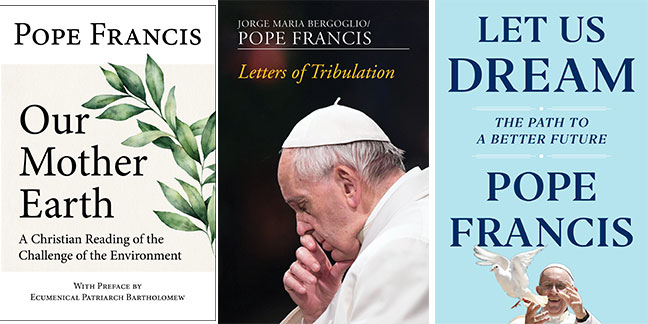 New books by Pope Francis, the spiritual leader of over 1 billion Catholics and a worldwide leader, provide guidance and encouragement for readers.
New books by Pope Francis, the spiritual leader of over 1 billion Catholics and a worldwide leader, provide guidance and encouragement for readers.
“Let Us Dream: The Path to a Better Future” by Pope Francis and Austen Ivereigh offers hope to readers coping with the COVID-19 pandemic and other crises of our time. The authors suggest how to view crises, discern how to deal with them and then take action.
In their prologue, Pope Francis and Ivereigh identify some contemporary crises. They assure readers, however, that God’s mercy will always help them cope. They state that “times of trial” are opportunities for “purification.” They say that these can help people mature and change their priorities.
Early in the book, they urge people facing a crisis in what they call a culture of “individualism and self-obsession” to “commit to the small, concrete, positive actions.” They assert this is better than responding selfishly or despairing.
They cite recent events signaling a societal call for change. These include the #MeToo movement, the protests over racial injustice after the death of George Floyd while in police custody and the anti-racist protests resulting in the removal of statues. The pope also shares three of his own personal crises.
In the second part, the authors encourage readers to discern the best actions to take in a challenging time. This requires openness, prayer and reflection, and valuing “fraternity over individualism.”
Finally, they suggest how to act on one’s beliefs. This involves respecting universal human rights and values.
The authors’ epilogue contains their advice to readers to let themselves be transformed by the current crises and be of service. They also include an inspiring poem. Ivereigh in a postscript describes how and why the book was written. “Let Us Dream” offers profound, practical and timely advice about surviving turbulent times.
In “Our Mother Earth: A Christian Reading of the Challenge of the Environment,” Pope Francis calls everyone to honor God’s gift of nature. He says that this can reduce pollution, climate change, the loss of biodiversity and the exploitation of resources.
The book includes a preface by Ecumenical Patriarch Bartholomew, two opening essays on the pope’s theology of ecology, ideas from 12 of his past encyclicals, audiences and homilies on the subject and a final new essay.
In his first two essays, Pope Francis calls for “global cooperation” to protect nature. He says new policies, programs and habits can help do this.
In his collection of past works, the pope reminds readers that “the future of all nations is interconnected.” He also says the earth’s resources are gifts and not simply to be used for greed, consumption and profit. He calls Christians to an “ecological conversion,” quoting his 2015 encyclical “Laudato Si’, on Care for Our Common Home.”
In his final essay, the pope suggests what can give readers hope for a better future – technology, a commitment to conversion, the liturgy and “a universal brotherhood.”
“Letters of Tribulation” by Pope Francis, with Jesuit Fathers Antonio Spadaro and Diego Fares, is a new version of the pope’s 1987 book of the same title.
In the original book, the pope – then a Jesuit priest in Argentina – shared a spiritual approach to dealing with difficulties, based on letters that 18th-century Jesuit superiors general had sent to their bishops coping with persecution. This had led to the Vatican’s suppression of their order in several countries from 1758 to 1831.
The pope’s expanded 2020 book includes a modern tribulation – the sexual abuse of minors and the abuse of power by priests and others in Church leadership roles.
In it, he includes letters that he sent to the bishops and the Church and the people of God in Chile in 2018. He had been prompted to write these after reading a Vatican report of 2018 on the problems of clerical sexual abuse there. These showed his desire to restore public trust in the Church and
Church leaders’ integrity with themselves and to heal abuse victims.
The book reveals the spiritual discernment needed by those facing persecution from “cultural and historic events.” The pope says this can help people avoid temptations to “argue over ideas, to not give to the matter the importance that it should be given, to concentrate too much on the persecutors and to keep going over the desolation of one’s mind.” Instead, he says to “move toward virtue and spiritual perfection” and suggests ways to do so.
Books featuring Pope Francis
n “Let Us Dream: The Path to a Better Future” by Pope Francis and Austen Ivereigh. Simon and Schuster (New York, 2020). 160 pp., $26.
n “Our Mother Earth: A Christian Reading of the Challenge of the Environment” by Pope Francis. Our Sunday Visitor (Huntington, Ind., 2020). 103 pp., $16.95.
n “Letters of Tribulation” by Pope Francis, with Father Antonio Spadaro, SJ, and Father Diego Fares, SJ. Orbis Books (Maryknoll, N.Y., 2020). 144 pp., $20.
— Jan Kilby, Catholic News Service


